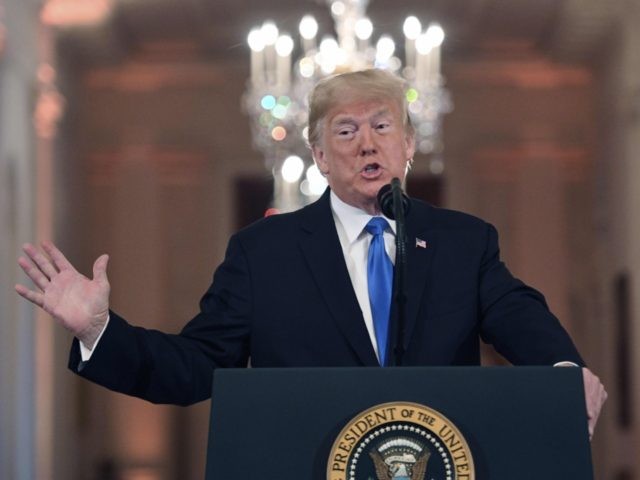President Donald Trump described the results of Tuesday’s midterm elections as the best possible outcome for the country on Wednesday morning, noting that a slim Democratic majority in the U.S. House would make it easier for him to achieve deals on big issues.
Speaking to the press from the East Room of the White House, Trump added that a slim Republican majority would have given small dissenting factions the ability to stop the legislative process. He also suggested Democrats should take the legislative initiative on policy:
So if the Republicans won, and let’s say we held on by two or one or three, it would have been very hard, having that many Republicans, to ever even get support among Republicans. Because there’ll always be one or two or three people that, for good reason or for bad reason or for grandstanding — we have that, too. You’ve seen that. You’ve seen that — plenty of grandstanding. But for certain reasons, that many people, you’re always going to have a couple that won’t do it. So that puts us in a very bad position.
In other words, had we kept — and this is no — I’m saying this for a very basic reason. It’s common sense. It puts us in a very tough position. We win by one or two or three, and you’ll have one or two or three or four or five, even, come over and say, “You know, look, we’re not going to go along with this. We want this, this, this,” and all of sudden, we — we can’t even — we wouldn’t even be able to get it, in many cases, out of the Republicans’ hands before we sent it on to the Senate.
And now, we have a much easier path, because the Democrats will come to us with a plan for infrastructure, a plan for health care, a plan for whatever they are looking at, and we’ll negotiate.
And as you know, it’s been very hard in the Senate, because we’ve — need, essentially, 10 votes from Democrats, and we don’t get those votes, because the Democrats do really stick together well. I don’t agree with them on a lot of policy, but I agree with them on sticking together. They stick together great.
So now, we go into the Senate, we don’t have the 10 votes, and what happens? It doesn’t get passed. Even if it gets out of the House, it doesn’t get passed.
So under the new concept of what we’re doing, I say, “Come on, let me see what you have.”
They want to do things.
…
So it really could be a beautiful, bipartisan type of situation. If we won by one or two or three or four or five, that wouldn’t happen, and the closer it is, the worse it is. This way, they’ll come to me, we’ll negotiate, maybe we’ll make a deal, maybe we won’t, that’s possible.
But we have a lot of things in common on infrastructure. We want to do something on health care, they want to do something on health care. There are a lot of great things that we can do together and now we’ll send it up. And now we’ll send it up and we will really get — we’ll get the Democrats and we’ll get the Republicans — or some of the Republicans. And I’ll make sure that we send something up that the Republicans can support, and they’re going to want to make sure they send something up that the Democrats can support.
Trump’s approach would seem to echo that of President Bill Clinton, who reacted to the midterm election loss (of both the House and the Senate) in 1994 by reaching out to Republicans. Clinton struck deals on welfare reform and a balanced budget that stand as the great achievements of his presidency.
It is a sharp contrast to the approach taken by President Barack Obama, who stuck to his left-wing agenda after suffering massive losses in the 2010 midterms and again in 2014. Obama deliberately torpedoed a “grand bargain” on spending in 2011, then rejected the recommendations of his own bipartisan commission on debt reduction.
Trump’s analysis seemed a genuine conviction, more than a rationalization of disappointing House results. His comments mirrored those of cartoonist and pundit Scott Adams, who drew similar conclusions on Wednesday morning:
Moreover, unlike Clinton who adopted the opposing party’s agenda, Trump still has leverage — through the Senate — to focus on his own policies while soliciting proposals from Democrats.
He also made it clear he intends to push back against Democrats if they tie his administration up in investigations by using the Senate to investigate them.
Joel B. Pollak is Senior Editor-at-Large at Breitbart News. He is a winner of the 2018 Robert Novak Journalism Alumni Fellowship. He is also the co-author of How Trump Won: The Inside Story of a Revolution, which is available from Regnery. Follow him on Twitter at @joelpollak.

COMMENTS
Please let us know if you're having issues with commenting.